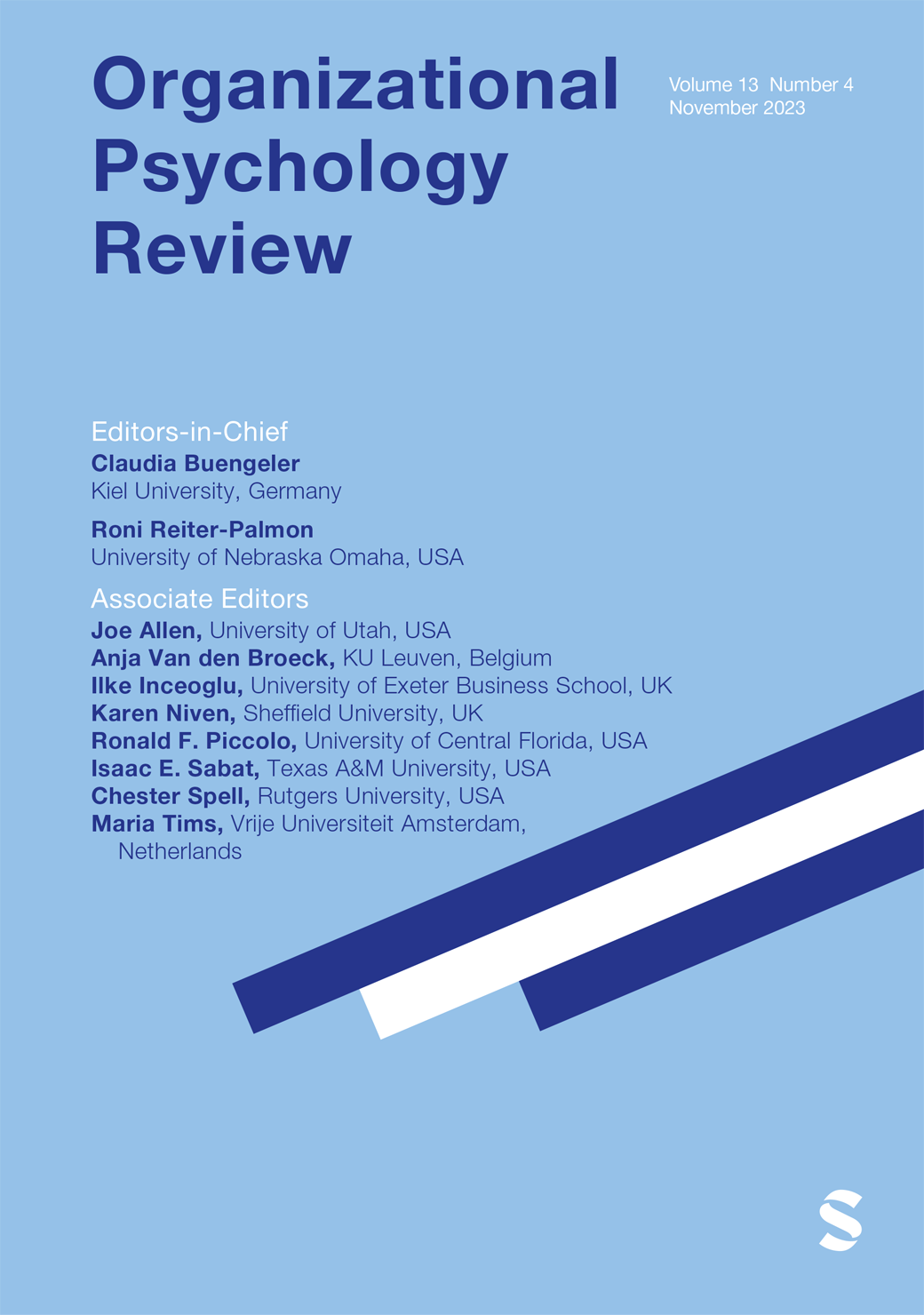A Conceptual Framework of How Meeting Mindsets Shape and Are Shaped by Leader–Follower Interactions in Meetings
IF 7.1
1区 心理学
Q2 MANAGEMENT
引用次数: 0
Abstract
In this conceptual paper, we define a person's meeting mindset as the individual belief that meetings represent opportunities to realize goals falling into one of three categories: personal, relational, and collective. We propose that in alignment with their respective meeting mindsets, managers use specific leadership claiming behaviors in team meetings and express these behaviors in alignment with the meeting setting (virtual or face-to-face) and their prior experiences with their employees. Employees’ responses, however, are also influenced by their meeting mindsets, the meeting setting, and prior experiences with their managers. The interplay between managers’ leadership claiming behavior and their employees’ responses shapes leader–follower relations. Embedded in the team context, the emerging leader–follower relations impact the meaning of meetings. We outline match/mismatch combinations of manager–employee meeting mindsets and discuss the influence that a manager and employee can have on each other's meeting mindset through their behavior in a meeting. Plain Language Summary Have you ever had the experience of entering a team meeting and quickly realizing that your idea of how the meeting conversation should be approached did not align with your boss's understanding of the meeting purpose? This is indeed a common experience in meetings between managers and their employees. While we understand much about the communication dynamics that occur in meetings, we know less about what motivates people to communicate in certain ways in meetings. In this conceptual paper, we classify people's understanding of meetings as being driven by one of three purposes: [1] to strategically position and promote themselves (which reflects a personal meeting mindset), [2] to shape collaborations and to ensure reciprocation (which reflects a relational meeting mindset), or [3] to strengthen the team identity and increase the willingness to go the extra mile for the team (which reflects a collective meeting mindset). Meeting mindsets shape how people enact their leader or follower role in meetings—that is, how a manager exhibits leadership and how employees react. However, managers’ and employees’ meeting mindsets may not necessarily match, which can trigger tensions and may ultimately change the way in which managers or employees define the meaning of meetings. Our research helps managers to comprehend the reasoning behind their own and other people's meeting behavior and may promote reflection on one's leadership approach, particularly in a team meeting context. It can also help employees to grasp the power they can have in terms of actively shaping their managers’ meeting mindsets.会议心态如何被会议中的领导-追随者互动所塑造的概念框架
在这篇概念性论文中,我们将一个人的会议心态定义为一种个人信念,即会议代表了实现以下三类目标之一的机会:个人、关系和集体。我们建议,为了与各自的会议心态保持一致,管理者在团队会议中使用特定的领导声称行为,并根据会议设置(虚拟或面对面)和他们之前与员工的经验来表达这些行为。然而,员工的反应也受到他们的会议心态、会议环境和之前与经理的经历的影响。管理者的领导要求行为和员工的反应之间的相互作用形成了领导-追随者关系。在团队环境中,新兴的领导-追随者关系影响着会议的意义。我们概述了经理和员工会议心态的匹配/不匹配组合,并讨论了经理和员工通过他们在会议中的行为对彼此会议心态的影响。你是否有过这样的经历:参加一个团队会议,很快意识到你对会议对话的看法与老板对会议目的的理解不一致?这确实是经理和员工开会时的常见经历。虽然我们对会议中的交流动态了解很多,但我们对人们在会议中以某种方式进行交流的动机知之甚少。在这篇概念性论文中,我们将人们对会议的理解分为以下三个目的之一:[1]是为了战略性地定位和提升自己(这反映了个人的会议心态),[2]是为了塑造合作并确保回报(这反映了一种关系会议心态),[3]是为了加强团队认同感并增加为团队付出额外努力的意愿(这反映了一种集体会议心态)。会议心态决定了人们在会议中如何扮演领导者或跟随者的角色——也就是说,经理如何展示领导力,员工如何反应。然而,管理者和员工的会议心态可能并不一定匹配,这可能引发紧张局势,并可能最终改变管理者或员工定义会议意义的方式。我们的研究有助于管理者理解他们自己和其他人的会议行为背后的原因,并可能促进对一个人的领导方法的反思,特别是在团队会议的背景下。它还可以帮助员工掌握他们在积极塑造经理会议心态方面可以拥有的权力。
本文章由计算机程序翻译,如有差异,请以英文原文为准。
求助全文
约1分钟内获得全文
求助全文
来源期刊

Organizational Psychology Review
Multiple-
CiteScore
10.00
自引率
1.60%
发文量
25
期刊介绍:
Organizational Psychology Review is a quarterly, peer-reviewed scholarly journal published by SAGE in partnership with the European Association of Work and Organizational Psychology. Organizational Psychology Review’s unique aim is to publish original conceptual work and meta-analyses in the field of organizational psychology (broadly defined to include applied psychology, industrial psychology, occupational psychology, organizational behavior, personnel psychology, and work psychology).Articles accepted for publication in Organizational Psychology Review will have the potential to have a major impact on research and practice in organizational psychology. They will offer analyses worth citing, worth following up on in primary research, and worth considering as a basis for applied managerial practice. As such, these should be contributions that move beyond straight forward reviews of the existing literature by developing new theory and insights. At the same time, however, they should be well-grounded in the state of the art and the empirical knowledge base, providing a good mix of a firm empirical and theoretical basis and exciting new ideas.
 求助内容:
求助内容: 应助结果提醒方式:
应助结果提醒方式:


